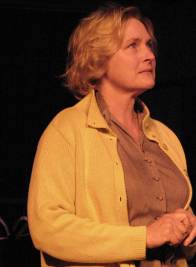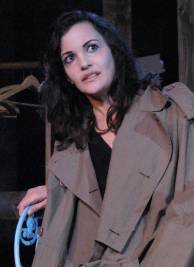 "Orpheus Descending" Review, 15.01.2010
"Orpheus Descending" Review, 15.01.2010by Steven Stanley.............................
 [ перевод на русский ]
[ перевод на русский ]photo: Ginger Perkins



Frantic Redhead Productions’ presentation of Tennessee Williams’ Orpheus Descending is a prime example of Los Angeles theater at its finest. A big-name trio of leading players with serious theatrical credits and training, a gifted director with an inspired concept, and one of the finest design teams in town have combined forces to make one of Williams’ lesser known dramas not only a surefire hit but the first major artistic success of 2010 as well.
We know we’re in Tennessee Williams territory from the get-go, a pair of local biddies gossiping about the return home of cancer-ridden town bigwig Jabe Torrance from an futile hospital stay (shades of Cat On A Hot Tin Roof). Jabe’s younger wife Lady, well-known to have been "bought” by Jabe as an eighteen-year-old bride, is now approaching middle age, her heart dried up from years spent in a loveless marriage. Free-spirited local beauty Carol Cutrere’s outlandish behavior has made her the town pariah. Vee Talbott, the sheriff’s wife, paints visionary Bible-related canvases, and has a problem with occasional bouts of sudden blindness.
Into this smoldering, sweaty caldron of a Southern town arrives sexy snakeskin-clad drifter Val Xavier, guitar in hand and ready to set the ladies’ hearts (and Lady’s heart) aflame and, like Orpheus, attempt to rescue Lady from her Southern Hades.
Naturally, fireworks ensue, as well as hatred, jealousy, and a murder or two.
Helming this rare revival of Williams’ relatively obscure 1957 Broadway play is award-winning film director Lou Pepe, obviously relishing this opportunity to create something theatrical as opposed to cinematic. Rather than being hampered by the limitations of on-a-budget 99-seat theater, Pepe uses this challenge as a basis for inspiration. He takes Williams’ stage direction that Orpheus Descending’s set should be "non-realistic” and extends it to the entire production, most notably its sound design. Nothing is prerecorded. Everything from its musical underscoring to the sounds of thunder, a calliope, dogs barking, a car horn, etc., happens live, accomplished actor/guitarist Robert E. Beckwith strumming appropriately moody tunes throughout, while fellow cast members serve as offstage foley artists. This is the first time I can ever recall this being done, and the effect is not just unique but frequently quite breathtaking.
Pepe goes back to Orpheus Descending’s mythical roots to stage Val, Lady, and Carol’s story as an ancient Greek tragedy. Lights come up on ensemble members wearing stylized masks. An African American "Conjure Man” takes their masks from them one by one, handing them in exchange items of clothing that transform them into the characters they will be portraying.
As for its cast, Orpheus Descending proves once again that for A-List talent, Los Angeles can’t be beat. Gale Harold’s lead performance as Val is likely to bring out Queer As Folk fans in droves wanting to see "Brian Kinney” up close and personal. They will be treated to a masterful performance about as dissimilar to Brian as night is to day, except for the magnetic presence Harold brings to the role. Star Trek: The Next Generation fans too will be coming from far and near to see "Tasha Yar” on stage in the person of Denise Crosby. The Ovation Award-nominated actress does brilliant, deeply-felt work as the emotionally wounded Lady, brought back to life by the mysterious stranger she hires to work in the dry goods store owned by her aged, dying husband. Covergirl-turned-actress Claudia Mason proves that beauty and acting chops can indeed go hand in hand with her moving portrayal of lost soul/misfit Carol, the favorite topic of conversation of small town gossips Dolly and Beulah.
Supporting actors are equally fine, most of them in multiple roles. The ever splendid Francesca Casale creates two very different portraits, her imperious nurse a dramatic contrast to the spacey Christ-obsessed Vee. Andy Forrest is excellent as Sheriff Talbot, and the same can be said for both Beckwith and John Gleeson Connolly in a number of roles. Standouts Kelly Ebsary and Sheila Shaw are a hoot as gossipy, judgmental Dolly and Beulah (though I must confess to not having realized that at times they were playing characters named Eva and Sister Temple). There was no confusion whatsoever, though, between Geoffrey Wade’s evil, death-warmed-over Jabe and still-virile David Cutrere. Curtis C vanishes into the spooky voodoo skin of Uncle Pleasant, aka "Conjure Man.”
David Mauer’s scenic design suggests the play’s dry goods store & "confectionary” setting in a non-literal way that Williams himself would surely have approved. Brandon Baruch’s lighting has a heightened theatrical quality entirely suiting Williams’ text and Mauer’s set design concept. Efrain Schunior’s sound design is, as previously mentioned, in a class by itself, and will be talked about almost as much as the production as a whole. Jane Anderson has costumed the cast to perfection, from Val’s snakeskin jacket to Carol’s beat generation black to Lady’s drab housedress and the slinky purple number she dons once her withered sexual flower has bloomed again.
Orpheus Descending’s script may not be at the level of Williams’ top three (The Glass Menagerie, A Streetcar Named Desire, and Cat On A Hot Tin Roof), but even "second-rate” Williams is more interesting than "first rate” [insert name of playwright]. In the talented hands of its cast, director, and designers, Orpheus Descending is proof positive that the "waiver” theater, unique to our city, can achieve world-class levels of excellence.
источник: stagescenela.com






